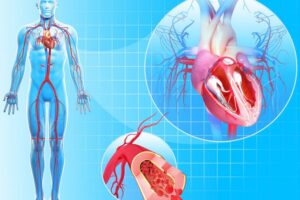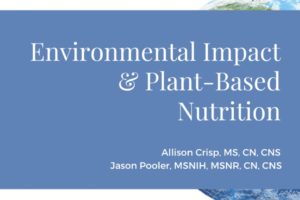Some might ask, “Why is a nutritionist writing a blog post about oral health? Shouldn’t that be something my dentist tells me?” While I agree that dentists have excellent opportunities to discuss how diet and oral health impact your future risk of disease, few ever do so. Since it’s hard to eat healthy food without teeth and since the costs of dental care are increasingly leaving out lower and middle class Americans, I thought it appropriate to explain the importance of diet and oral health.
Research is revealing that when our gums become inflamed, such as in gum disease (or as your dentist will say to sound super smart, periodontal disease), bacteria can take root. Bacteria are always in our mouth, and just like we have discovered we have a whole community of microorganisms living in our guts we also have a community of bacteria living in our mouths.1 Research has shown the number of species in our mouths to be upwards of 700.2 As we are learning about our guts, saying that bacteria take root isn’t all that helpful so I will use the term “harmful bacteria” to differentiate the microorganisms that tend to lead to negative outcomes from those that tend to live more in harmony with us.
Ok, before I go further into the evidence showing how oral health can impact our risk for future diseases I will pause since some might not be convinced that it’s important to care about our oral health. Other than the fact that it’s super gross to have nasty oral health, there are performance reasons to consider. A study published in the British Journal of Sports Medicine found that oral health had an impact on athletes participating in the 2012 Olympic Games in London.3 This study looked at over 278 athletes in 25 different sports and found that 55% had dental caries (or cavities as most of us know them), 45% had dental erosion, 76% had gingivitis, and 15% had periodontitis.3 In addition, 40% acknowledged that they were “bothered” by their poor oral health, while 28% reported that it impacted their quality of life and 18% reporting an impact to training and performance.3 I mention this because many may not be swayed by the future risk I will detail below, but may be swayed by knowing that oral health can impact athletic performance, and for men this can be translated into a potential negative impact to your sex life. If poor oral health can impact an Olympic athlete I think it’s safe to say it can impact your performance in the bed room as well.
Evidence for how oral health impacts our future risk of disease
One of the risks that poor oral health presents us is an increased risk of a variety of cancers such as oral, esophageal, pancreatic and gastric.2 One of the mechanisms is via alcohol, where bacteria in our mouth convert the alcohol to acetaldehyde, a chemical widely known as a human carcinogen.2 However it’s not only alcohol that gets turned into a carcinogen in our mouths, as it’s known that smoking tobacco is also problematic.2 With tobacco, bacteria can take the already carcinogenic nitrosamines (which are often found in processed meats and are at least part of the reason for the negative health impacts of processed meats4,5) and increase their activation.2 If that wasn’t enough for you then also know that while smoking, bacteria can increase the production of acetaldehyde when drinking alcohol.2 I don’t know about you, but I know few people who smoke that don’t also drink alcohol while smoking.
While it’s not that big a surprise that alcohol and tobacco affect oral health, this doesn’t explain everything as there are plenty of people with poor oral health that don’t smoke or drink alcohol. It’s in these cases that we return to the microbiome for the mechanism of action. Other studies have pointed to a link between cardiovascular disease, diabetes, and periodontal disease.6,7 In fact, we have found oral bacteria in atherosclerotic plaque (the nasty stuff that gums up our arteries…which interestingly enough form hardened areas in our arties much like the hard plague found on our teeth).8 On top of all this, it has been shown that those with cardiovascular disease or diabetes, that also have gum disease, will see additional improvements in both conditions when the gum disease is treated.2 The latest research just came out showing that the bacteria in gum disease can actually travel throughout the body where it has been implicated in conditions including Alzheimer’s disease, rheumatoid arthritis, and aspiration pneumonia.9 While it was known that the bacteria had been found in the brains of patients with Alzheimer’s, this study actually compared the brains of healthy individuals of the same age and found it much more in those with Alzheimer’s.9
This helps paint the picture that even though the athletes in the British Olympic study may have had some performance issues due to the pain involved with poor oral health, their performance may also have been impacted by the impact of the foods these athletes were eating. When combined with poor oral hygiene, a microbiome in the mouth that flourishes in a high sugar and nitrosamine environment can make matters worse.
So what can you do?
The first thing to do is to make sure you take the time to brush and floss your teeth. If you have dental insurance, make a concerted effort to get into your dentist for cleaning as often as your insurance will allow. In addition, it’s important to consider your diet such as your intake of alcohol for starters, but also your intake of refined sugars, and processed meats. While bacon and burgers might make you feel manly it’s actually leading to issues that make it more difficult to be so in the bedroom and unfortunately the same goes for you ladies. Meanwhile, a diet rich in vegetables and fruits encourages the growth of more healthy bacteria. While I’m fine with the use of antiseptic mouthwashes when a person has an infection of the mouth. I generally advise against it because the healthy bacteria in our mouths are necessary to help convert the nitrates and nitrites in foods like beets to the form that our bodies can use to help with cardiovascular health and athletic performance.10, 11, 12 This capacity of our oral bacteria to produce products that help with health has been shown to be reduced in people using antiseptic mouthwashes.12 This is why I use a non-antiseptic mouthwash and save the antiseptic types for those pesky times when I bite my tongue while eating.
What about oil pulling?
While some research seems to show that oil pulling will help with plaque and gingivitis, a closer examination shows that pulling water to be just as good without the cost.13 In addition water works better to fight bad breath and to whiten teeth and other studies show that oil pulling can actually increase the erosion of calcium from teeth.14 Meanwhile, oil pulling can increase your risk of lipoid pneumonia which happens when some of the oil gets inhaled into your lungs leading to infection.15 So if you want to swish anything in your mouth, opt for a non-antiseptic mouth rinse, plain old water or consider adding herbs like cinnamon to the water.
References:
1. Dewhirst, F. E., et al. (2010). The human oral microbiome. Journal of bacteriology, 192(19), 5002–5017. doi:10.1128/JB.00542-10
2. Ahn J, Chen CY, Hayes RB. Oral microbiome and oral and gastrointestinal cancer risk. Cancer Causes Control. 2012 Mar;23(3):399-404. doi: 10.1007/s10552-011-9892-7. Epub 2012 Jan 22. PubMed PMID: 22271008; PubMed Central PMCID: PMC3767140.
3. Needleman, I., et al. (2013). Oral health and impact on performance of athletes participating in the London 2012 Olympic Games: a cross-sectional study. British journal of sports medicine, 47(16), 1054–1058. doi:10.1136/bjsports-2013-092891
4. Santarelli, R. L., Pierre, F., & Corpet, D. E. (2008). Processed meat and colorectal cancer: a review of epidemiologic and experimental evidence. Nutrition and cancer, 60(2), 131–144. doi:10.1080/01635580701684872
5. Genkinger, J. M., & Koushik, A. (2007). Meat consumption and cancer risk. PLoS medicine, 4(12), e345. doi:10.1371/journal.pmed.0040345
6. Kebschull, M., Demmer, R. T., & Papapanou, P. N. (2010). “Gum bug, leave my heart alone!”–epidemiologic and mechanistic evidence linking periodontal infections and atherosclerosis. Journal of dental research, 89(9), 879–902. doi:10.1177/0022034510375281
7. Pizzo, G., Guiglia, R., Russo, L. L., & Campisi, G. (2010). Dentistry and internal medicine: from the focal infection theory to the periodontal medicine concept. European Journal of Internal Medicine, 21(6), 496–502. doi:10.1016/j.ejim.2010.07.011
8. Tonetti, M. S., et al. (2007). Treatment of Periodontitis and Endothelial Function. New England Journal of Medicine, 356(9), 911–920. doi:10.1056/nejmoa063186
9. Nutritionreview.org. (April 8, 2019). Gum Bacteria Linked to Alzheimer’s, Rheumatoid Arthritis and Pneumonia. Nutrition Review. Retrieved from: https://nutritionreview.org/2019/04/gum-bacteria-linked-to-alzheimers-rheumatoid-arthritis-and-pneumonia/
10. Webb A.J., et al. (2008). Acute Blood Pressure Lowering, Vasoprotective, and Antiplatelet Properties of Dietary Nitrate via Bioconversion to Nitrite. Hypertension. 51(3):784-90. Epub 2008 Feb 4. Retrieved from: https://www.ahajournals.org/doi/pdf/10.1161/hypertensionaha.107.103523
11. Wink D.A., Paolocci N. (2008). Mother Was Right: Eat Your Vegetables and Do Not Spit! When Oral Nitrate Helps With High Blood Pressure. Hypertension. 51(3):617-9.
12. Govoni, M, Jansson, E.A., Weitzberg, E., Lundberg, J.O. (2008). The increase in plasma nitrite after a dietary nitrate load is markedly attenuated by an antibacterial mouthwash. Nitric Oxide. 19(4):333-7.
13. Greger, M. (December 8th, 2017). Oil Pulling Benefits for Plague & Gingivitis. NutritionFacts.org. Retrieved from: https://nutritionfacts.org/video/oil-pulling-benefits-for-plaque-and-gingivitis/
14. Greger, M. (December 11th, 2017). Oil Pulling for Teeth Whitening & bad Breath Tested. NutritionFacts.org. Retrieved from: https://nutritionfacts.org/video/oil-pulling-for-teeth-whitening-and-bad-breath-tested/
15. Greger, M. (December 13th, 2017). The Risks of Oil Pulling. NutritionFacts.org. Retrieved from: https://nutritionfacts.org/video/the-risks-of-oil-pulling/







